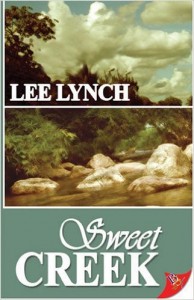 Sweet Creek
Sweet Creek
by Lee Lynch
Bold Strokes Press. 300 pages, $15.95
FROM THE MID-1980’s to the late 90’s, Lee Lynch was one of the most prolific authors of the lesbian-feminist literary renaissance. Her first novel, Toothpick House, published in 1984 and misread by many as a simple romance, was a milestone in that it was one of the first lesbian books to examine the divide between old school bar butches and femmes and those in the nouveau lesbian-feminist movement who looked down their middle-class noses at what they saw as sexist role-playing. After a collection of short stories, Old Dyke Tales, which harked back to Lynch’s early years of writing for The Ladder, she released The Swashbuckler, now considered a butch femme classic, set in Greenwich Village on the brink of the gay political movement. She continued to publish a book every year or so, building up a body of work that resulted in a huge following and made her one of lesbian literature’s best-loved and oft-quoted authors. In 1997, she released the politically charged Rafferty Street, influenced by a series of attempted anti-gay bar measures sponsored by the Christian right in her adopted state of Oregon.
This steady output was followed by a nine-year silence, which is broken at last with the publication of Sweet Creek
While Lynch is a master storyteller and Sweet Creek’s good-versus-evil plot makes it a page turner, the characters are so vividly drawn as to overshadow the action of the book. So interesting are their inner lives that one suspects Lynch’s storylines are merely an excuse to delve into the human soul. The tale is narrated by its four major characters. First there’s Chick, the fat, old-fashioned femme, a person who’s pure “id,” a conduit of pleasure and pain, who keeps her highs and lows in check with prescription drugs. Next is the unfocused Jeep, who dances at Wal-Mart with an unselfconscious joy and follows her own inner music. Katie, obsessed with success, spends more time recording her life than actually living it. Last but not least is Donny, Chick’s butch lover, who’s sensible, streetwise, tough and lean for the fight—the caretaker who needs more than anything to be needed.
In Sweet Creek no one is safe from Lynch’s unflinching eye, and she takes a number of well-aimed swipes at a catalog of lesbian sacred cows: the back-to-the-land movement, gender reassignment, the humorless inflexibility of lesbian separatists, New Age spiritual practices, and many more. Running parallel to the fast-moving story is a clear-eyed and not always flattering depiction of the lesbian community and its peculiar foibles—the constant presence of those who need to position themselves as politically or morally superior, the idiocies and indignities we inflict on each other under the guise of ideology. What also emerges is an interesting and very real portrayal of a lesbian in middle age, as vanity confronts the breakdown of the body and one begins to assess one’s life choices and their consequences.
Lynch refuses to idealize her characters and resists giving them a definitive ending, choosing instead to leave a few questions in the reader’s mind. Perhaps the nine-year hiatus since her last novel has allowed Lynch to step back from the community and from the feeling that she needs to be the voice of a movement. The voice she has found is both more nuanced in its insights and confident in its mode of expression.
_____________________________________________________
Joy Parks, who writes reviews for several North American dailies, has a story in the forthcoming The Future is Queer (Arsenal Pulp Press).





